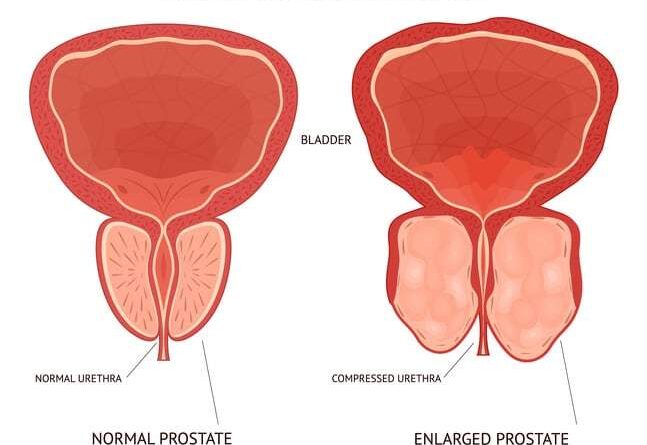
Stress has become an integral part of modern life, affecting people’s well-being in various ways. While it is commonly known that stress can impact mental and physical health, its connection to prostate problems might not be as well understood. In this article, we will explore the relationship between stress and prostate problems and delve into the ways stress can affect the prostate. Additionally, we will provide strategies for managing stress to promote prostate health.
Introduction
Stress is a natural response of the body to demanding situations. It triggers a cascade of physiological and psychological changes, preparing us to face challenges. However, chronic or prolonged stress can have detrimental effects on our overall health, including the prostate gland.
Understanding Prostate Problems
Before delving into the impact of stress on the prostate, it is essential to have a basic understanding of prostate problems. The prostate is a small gland located below the bladder in men. It plays a vital role in reproductive function and is prone to various conditions such as benign prostatic hyperplasia (BPH), prostatitis, and prostate cancer.
The Relationship Between Stress and Prostate Problems
While stress does not directly cause prostate problems, research suggests that it can worsen existing conditions or contribute to their development. Understanding the intricate relationship between stress and prostate problems can help individuals take proactive steps towards maintaining their prostate health.
How Stress Affects the Prostate
Stress triggers a release of stress hormones like cortisol and adrenaline, which can disrupt the delicate balance within the body. This hormonal imbalance can lead to inflammation, weakened immune function, and hormonal irregularities that can impact the prostate gland.
Stress and Prostate Enlargement (Benign Prostatic Hyperplasia)
Benign Prostatic Hyperplasia (BPH), commonly known as an enlarged prostate, is a non-cancerous condition that affects many aging men. While the exact causes of BPH are not fully understood, stress is believed to play a role in its progression. Chronic stress can exacerbate inflammation and hormonal imbalances, contributing to the enlargement of the prostate gland.
Stress and Prostatitis
Prostatitis is the inflammation of the prostate gland and can cause pain, discomfort, and urinary symptoms. Stress can weaken the immune system, making the body more susceptible to infections, including those that affect the prostate. Additionally, stress can heighten the perception of pain, intensifying the symptoms experienced by individuals with prostatitis.
Stress and Prostate Cancer
Prostate cancer is a complex disease with multifactorial causes. While stress alone does not cause prostate cancer, chronic stress can weaken the immune system and contribute to overall health decline, potentially increasing the risk of cancer development. Furthermore, stress can influence health behaviors such as poor diet, lack of exercise, and substance abuse, which are known risk factors for prostate cancer.
Managing Stress for Prostate Health
Recognizing the impact of stress on prostate problems emphasizes the importance of effective stress management for overall well-being. Here are some strategies that can help individuals reduce stress levels and promote prostate health:
Lifestyle Changes for Stress Reduction
Lifestyle changes play a significant role in reducing stress levels and promoting prostate health. By incorporating healthy habits into daily life, individuals can better manage stress and support their overall well-being.
One of the key lifestyle changes is maintaining a balanced diet. Consuming nutritious foods, such as fruits, vegetables, whole grains, lean proteins, and healthy fats, can provide the body with essential nutrients and support optimal function. Avoiding excessive consumption of processed foods, sugary snacks, and caffeine can also help stabilize energy levels and reduce stress.
Regular exercise is another crucial aspect of stress management. Engaging in physical activity releases endorphins, which are known as “feel-good” hormones that promote a sense of well-being and help alleviate stress. Activities like walking, jogging, swimming, or participating in sports can not only reduce stress levels but also contribute to overall cardiovascular health.
Incorporating relaxation techniques into daily routines can also be beneficial for stress reduction. Mind-body techniques such as meditation, deep breathing exercises, and yoga have been shown to calm the mind, reduce anxiety, and promote relaxation. These practices can help individuals cultivate a sense of inner peace and resilience in the face of stressful situations.
Seeking social support is vital for managing stress. Connecting with friends, family, or support groups provides an outlet for sharing emotions, receiving guidance, and gaining perspective. Engaging in hobbies, pursuing interests, or participating in group activities can also help individuals relax and find joy, further reducing stress levels.
When stress becomes overwhelming or starts interfering with daily life, it is important to seek professional help. Mental health professionals, such as therapists or counselors, can provide valuable guidance, support, and coping strategies for managing stress effectively. They can help individuals explore underlying causes of stress, develop healthier coping mechanisms, and create personalized stress management plans.
In Conclusion
While stress does not directly cause prostate problems, it can have a significant impact on their development and progression. Chronic stress can contribute to prostate enlargement, inflammation, and overall decline in prostate health. By managing stress effectively through lifestyle changes, relaxation techniques, social support, and seeking professional help when needed, individuals can promote their prostate health and overall well-being.
FAQs
1. Can stress alone cause prostate cancer? No, stress alone does not cause prostate cancer. Prostate cancer is a complex disease with multiple risk factors. However, chronic stress can weaken the immune system and contribute to overall health decline, potentially increasing the risk of cancer development.
2. Can stress worsen the symptoms of prostatitis? Yes, stress can exacerbate the symptoms of prostatitis. Stress weakens the immune system and can intensify pain perception, leading to increased discomfort and urinary symptoms associated with prostatitis.
3. Are all prostate problems related to stress? No, not all prostate problems are directly related to stress. Prostate problems can have various causes, including age, hormonal imbalances, genetics, and lifestyle factors. However, stress can worsen existing conditions or contribute to their development.
4. How long does it take for stress management techniques to show results in prostate health? The effectiveness of stress management techniques can vary from person to person. While some individuals may experience immediate benefits, others may require consistent practice over time to notice significant improvements in their prostate health.
5. Can stress management techniques be beneficial for overall health besides prostate health? Yes, stress management techniques have a wide range of benefits for overall health. They can help reduce anxiety, improve sleep quality, enhance immune function, promote cardiovascular health, and contribute to overall well-being beyond prostate health.
6. Are there any natural supplements or herbs that can help with stress and prostate health? While certain natural supplements and herbs are believed to have stress-reducing properties and potential benefits for prostate health, it is important to consult with a healthcare professional before starting any new supplements. They can provide personalized advice based on your specific needs and medical history.
7. Can stress management techniques prevent the development of prostate problems? While stress management techniques cannot guarantee the prevention of prostate problems, they can contribute to overall prostate health and potentially reduce the risk or severity of certain conditions. By effectively managing stress, individuals can support their immune system, reduce inflammation, and maintain a healthier lifestyle, which may positively impact prostate health.
8. Can high-stress levels affect prostate-specific antigen (PSA) test results? Yes, high-stress levels can potentially affect PSA test results. Stress and anxiety may cause temporary elevations in PSA levels. It is advisable to inform your healthcare provider about any recent stressful events or emotional states before undergoing a PSA test to ensure accurate interpretation of the results.
9. Can stress management techniques be helpful for individuals with prostate cancer? Yes, stress management techniques can be beneficial for individuals with prostate cancer. While they cannot cure the disease, they can contribute to overall well-being, reduce anxiety, improve quality of life, and provide coping mechanisms during the treatment journey. It is important for individuals with prostate cancer to work closely with their healthcare team to develop a comprehensive care plan that includes stress management strategies.
10. Can stress reduction techniques have an impact on sexual function in individuals with prostate problems? Yes, stress reduction techniques can potentially have a positive impact on sexual function in individuals with prostate problems. By managing stress levels, individuals may experience improved psychological well-being, reduced anxiety, and enhanced sexual satisfaction. However, it is important to address any specific concerns with a healthcare professional for personalized guidance and treatment options.
Remember, while stress is a common part of life, taking proactive steps to manage it can contribute to better overall health, including prostate health. By adopting stress management techniques, individuals can promote their well-being and potentially reduce the impact of stress on prostate problems. Always consult with healthcare professionals for personalized advice and support in managing stress and prostate health.







